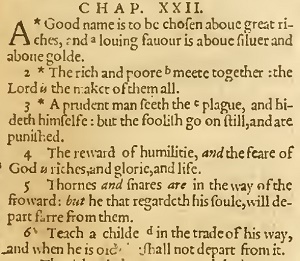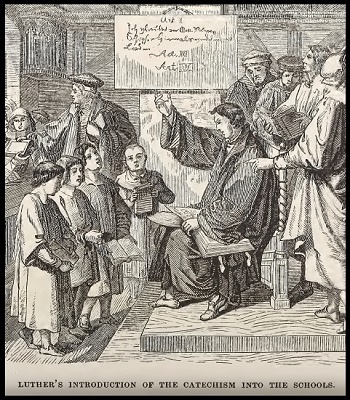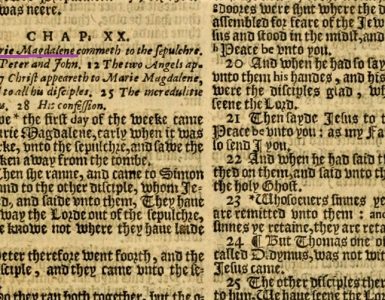 Proverbs 22:6 is a familiar Bible verse for many Christians—Train up a child in the way he should go, and when he is old he will not depart from it, and it is the locus classicus, the key passage, cited by churches to promote their Sunday and summer Bible programs for children. It is a beloved passage for Christian schools because it so specifically connects training with children. Those in Israel hearing or reading this verse of Solomonic wisdom were likely reminded of Moses’ brief but foundational instructions to Covenant households in Deuteronomy 6:4-9.
Proverbs 22:6 is a familiar Bible verse for many Christians—Train up a child in the way he should go, and when he is old he will not depart from it, and it is the locus classicus, the key passage, cited by churches to promote their Sunday and summer Bible programs for children. It is a beloved passage for Christian schools because it so specifically connects training with children. Those in Israel hearing or reading this verse of Solomonic wisdom were likely reminded of Moses’ brief but foundational instructions to Covenant households in Deuteronomy 6:4-9.
Hear, O Israel—The LORD our God, the LORD is one. You shall love the LORD your God with all your heart and with all your soul and with all your might. And these words that I command you today shall be on your heart. You shall teach them diligently to your children, and shall talk of them when you sit in your house, and when you walk by the way, and when you lie down, and when you rise. You shall bind them as a sign on your hand, and they shall be as frontlets between your eyes. You shall write them on the doorposts of your house and on your gates (ESV).
The Hebrews were instructed to love God and never allow thoughts of his graciousness and commandments pass from them, nor were they to forget teaching their children in the ways of God. The Word of God was and is to be stamped upon his people and their homes to govern their thinking and growth in grace.
A previous post on Presbyterians of the Past, “Read Your Bible, Celebrate the Reformation,” encouraged Christians to take advantage of the vernacular Word which has been provided through the Reformation’s sola Scriptura emphasis, but confessional Protestants have additional tools available to them for teaching children in the way they should go. Due to the complexity and extensiveness of Scripture’s content, catechisms have been used since the first centuries of the church for instructing children and novices in the faith. The word “catechism” finds its derivation from the Greek language and it is used to describe a text for teaching which commonly follows a question and answer format. The instructor’s reading of a question prompts the catechumen, the student, to remember the answer that was memorized. A well composed catechism has a logical progression with key words linking one question to its answer, which is then linked to the next question and its answer, etc. Whether the catechism is used for training a child of the Covenant in a Christian home or to instruct a more mature new Christian in the rubrics of the faith, its value is in its simplicity, brevity, and mnemonic efficiency. An important aspect of a child’s training in confessional churches and their congregations’ households is the catechism.
 In 1529, Martin Luther composed his small catechism. It was a simple edition which included the Ten Commandments, the Apostles’ Creed, the Lord’s Prayer, a prayer for meals, and some other important instructions for Christians. In the preface, Luther said that he wrote the catechism because during a visitation of churches in area towns he found that the people knew “nothing about Christian doctrine” and even some of the pastors were “quite unfit and incompetent to teach.” He encouraged reforming ministers to use the catechism to teach adults but “especially … the young.” His catechism provided a concise and simple way to bring reform and understanding to people of all ages. As is related by Luther in the following quote, he found his catechism particularly helpful not only for training his children but also for himself.
In 1529, Martin Luther composed his small catechism. It was a simple edition which included the Ten Commandments, the Apostles’ Creed, the Lord’s Prayer, a prayer for meals, and some other important instructions for Christians. In the preface, Luther said that he wrote the catechism because during a visitation of churches in area towns he found that the people knew “nothing about Christian doctrine” and even some of the pastors were “quite unfit and incompetent to teach.” He encouraged reforming ministers to use the catechism to teach adults but “especially … the young.” His catechism provided a concise and simple way to bring reform and understanding to people of all ages. As is related by Luther in the following quote, he found his catechism particularly helpful not only for training his children but also for himself.
I, too, am a theologian who has attained a fairly good practical knowledge and experience of Holy Scriptures through various dangers. But I do not so glory in this gift as not to join my children daily in prayerfully reciting the Catechism, that is, the Ten Commandments, the Creed, and the Lord’s Prayer and meditating on them with an attentive heart. I do not merely pass over the words hurriedly, but I carefully observe what the individual word means. And really, if I do not do this but am preoccupied with other business, I feel a definite loss because of the neglect. For God gave the Word that we should impress it on ourselves, as Moses says [in Deuteronomy 6:7], and practice it. Without this practice our souls become rusty, as it were, and we lose ourselves.
The central Reformer for the doctrine of Presbyterian and Reformed churches is John Calvin. He published his first catechism in the French language in 1537 for local use by the churches in Geneva. It included brief summaries of important doctrines, short commentaries on the Apostles’ Creed and Lord’s Prayer, and some instruction regarding pastors and the ministry of the church, however it did not use the question and answer format. By 1545 he had lengthened his catechism considerably and changed its method of presentation to 373 questions and answers. The question and answer method he used is designed as a scripted conversation between a master and a student with some questions answered by a simple “yes” or “no” while in other cases the answers constitute a moderate paragraph. The conversational form of the catechism makes it easier for the student to remember doctrinal truths. Even though the Reformation emphasized that Scripture, teaching, and worship should be in the common languages of the people, Calvin published the 1545 edition of his catechism in Latin so ministers and teachers in Germany, England, Spain, Poland, and other countries could read it and then translate it into their own tongues as needed.
Catechisms during the Reformation were especially helpful for teaching a predominantly non-literate population the basics of the faith. However, even though a lack of literacy—depending on how one defines literacy—is not a great problem today, catechisms continue to provide the essentials of the faith and key points of doctrine as determined from Scripture. Just as a lighthouse assists a helmsman navigating a ship through hazardous seas, so a catechism guides a Christian’s thinking about God and his plan of salvation through the rough waters of false teaching. Twenty-first century Christians face a barrage of teachers from television, movies, social media, and web sites, so it is important to have a standard for doctrinal guidance such as catechisms and confessions. The Apostle Paul has reminded God’s people to “no longer be children, tossed to and fro by the waves and carried about by every wind of doctrine, by human cunning, by craftiness in deceitful schemes” (Eph. 4:14). Catechisms can guide twenty-first-century Christians as surely as they have since the ancient church, besides, the brevity of catechism questions makes for edifying reading on a smart phone while waiting for your car to be serviced.
Barry Waugh
Sources—The brief quoted bits and block quote by Luther are from What Luther Says: A Practical In-Home Anthology for the Active Christian, which was compiled by Ewald M. Plass and published by Concordia Publishing House in St. Louis, 1959, the pages are 117 and 125-126 respectively.





